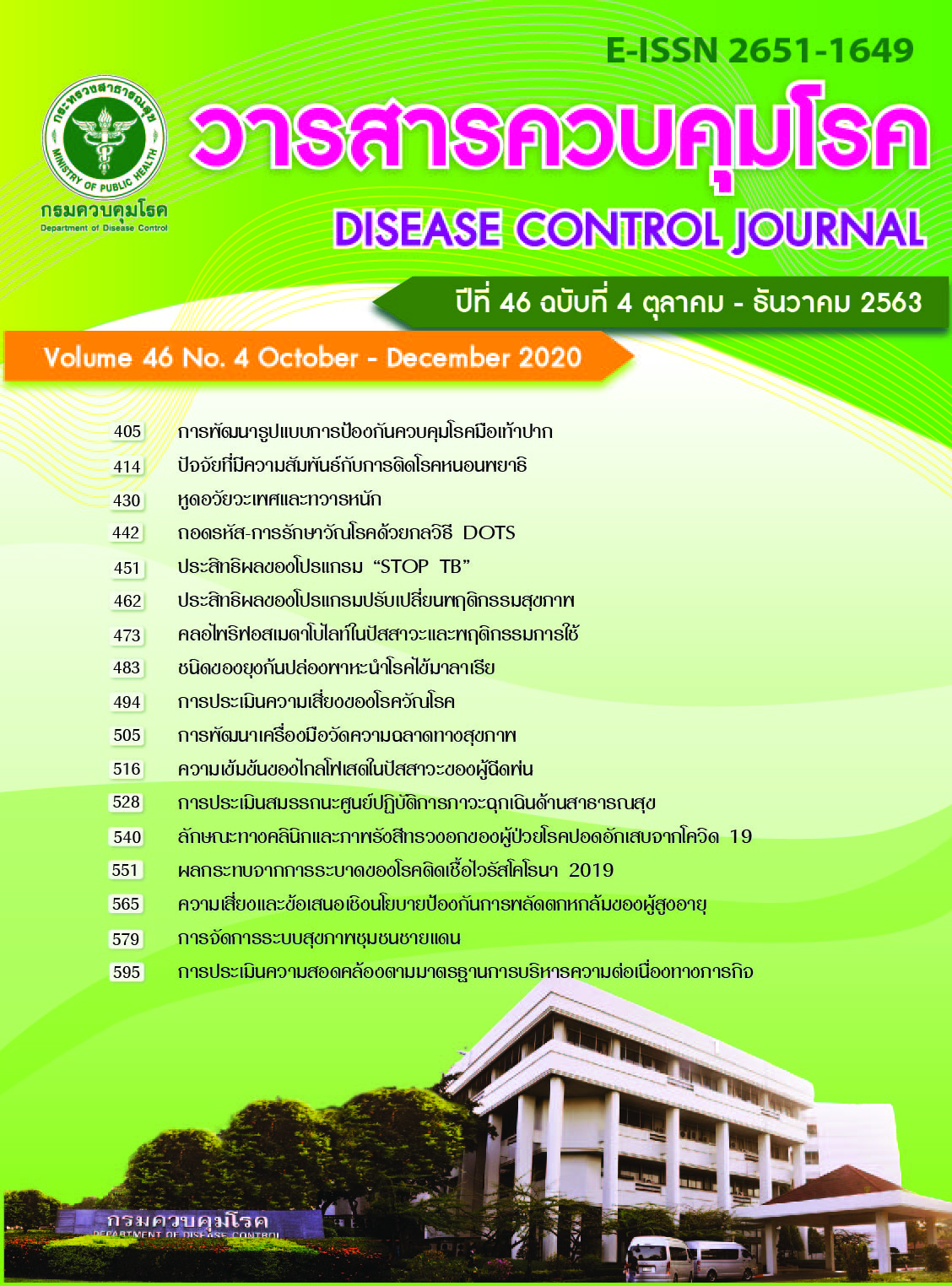The effectiveness of the “STOP TB” program in accordance with Health Belief Model to promote behaviors the prevention of infection transmission of pulmonary tuberculosis patients
DOI:
https://doi.org/10.14456/dcj.2020.42Keywords:
“STOP TB” Program, Health Belief Model, Infection Transmission, Behavior the prevention of infection transmission, Pulmonary tuberculosis patientsAbstract
This quasi-experimental study aims to investigate the effect of the “STOP TB” program in accordance with health belief model to promote behaviors in prevention of Infection transmission among patients with pulmonary tuberculosis at the Central Chest Institute of Thailand. Forty new pulmonary tuberculosis patients registered at the institute during December 2019 to April 2020 were recruited and randomly divided into two groups including the comparison group and the experimental group. The comparison group (n=20) was received routine health education whereas the experimental group (n=20) was received intensified health program on tuberculosis, named “STOP TB”. “STOP TB” program was created to promote behaviors of new pulmonary tuberculosis patients to prevent the spreading of tuberculosis in the community. Flip charts, video media and health books regarding tuberculosis disease together with practice training for health promotion and prevention in the spreading of disease were included in this program. Additionally, the experimental group was monitored by telephone visits during the intensive period (2 months) through a questionnaire to evaluate the patients’ health beliefs and health behaviors in prevention of the spreading of tuberculosis in the community. Statistical analysis was performed using Dependent and Independent -Sample t-test. The findings of this study shown that the experimental group engaged with “Stop TB” program had significantly higher scores than the pre intervention (p < .05) and the comparison group (p < .05). “STOP TB” program was effective in term of health beliefs and health behaviors which could prevent the spreading of tuberculosis in the community.
Downloads
References
Bureau of Tuberculosis. Guidelines for prevention and control of tuberculosis transmission. Nonthaburi: Department of Disease Control (TH); 2016. (in Thai)
World Health Organization. Global tuberculosis report 2015. 20th ed. Geneva: World Health Organization; 2015.
Bureau of Tuberculosis. National tuberculosis control programme guideline, Thailand, 2018. Nonthaburi: Department of Disease Control (TH); 2018. (in Thai)
Ministry of Public Health, Office of the Permanent Secretary, Strategy and Planning Division. Details of indicators from the Ministry of Public Health budget year 2018 [Internet]. 2017 [cited 2019 Mar 15]. Available from: https://www.drive.google.com/file/d/1b3nW0JZYlHy5THKYj-ewWedyU6EuqBI5/view (in Thai)
Chaisiriprasert Y. Factors associated with adherence to tuberculosis treatment among new tuberculosis patients in the Central Chest Institute of Thailand. Nonthaburi: Central Chest Institute of Thailand; 2017. (in Thai)
Chewakul K, Paicharoen R, Chanakarn T. Factors associated with default in new tuberculosis patients in Central Chest Institute of Thailand. Nonthaburi: Central Chest Institute of Thailand; 2018. (in Thai)
Saraboon R. An application of health belief model and social support for promoting preventive behaviors among pulmonary tuberculosis patients in Wangsaphung Hospital, Loei Province. KKU Res J (GS). 2012;12(3):29-37. (in Thai)
Kosecrattanapiban J. Results of multimedia applications program for learning knowledge, perception of health beliefs and behaviors to prevent the spread of infection in patients with pulmonary tuberculosis who received services from song department at Phaarjunphun Ajaro Hospital. Journal of Nurses’ Association of Thailand, North-Eastern Division. 2013;31(3):170-7. (in Thai)
Becker MH, Maiman LA. Sociobehavioral determinants of compliance with health and medical care recommendations. Med Care. 1975;13(1):10-24.
TB/HIV Research Foundation. TB prevention for close people [Internet]. 2019 [cited 2019 Aug 1]. Available from: https://www.tbhivfoundation.org
Pratum N. The development of health education model for promote preventive behaviors against diabetes of people at risk in Muang Sam Sip District, Ubon Ratchathani Province [master’s thesis]. Ubon Ratchathani: Ubon Ratchathani Rajabhat University; 2008. (in Thai)
Julawonno N. Effects of an individual education program on self-care behavior among patients with Tuberculosis. The Southern College Network Journal of Nursing and Public Health. 2016;3(1):17-30. (in Thai)
Noppakun P. Effects of teaching with multi-media on health beliefs and practices in prevention of infection transmission among patients with pulmonary tuberculosis [master’s thesis]. Chiang Mai: Chiang Mai University; 2007. (in Thai)
Ekajit A, Moongtui W, Boonchieng W. Comparison of effects of self-regulation with education and education on practices in prevention of infection transmission among pulmonary tuberculosis patients. Nursing Journal. 2013;40(4):1-11. (in Thai)
Sarasasin R, Kijsripisan S, Ratchanakul R. Effects of promoting adherence to a treatment regimen on the intention and adherence behaviors among pulmonary tuberculosis patients. Nursing Journal. 2013;40(2):161-73. (in Thai)
Mukarsa S, Sumpowthong K. Effect of health promotion program by applying the theory of empowerment in new smear positive pulmonary tuberculosis patients. J Med Health Sci. 2017;24(1):13-27. (in Thai)
Downloads
Published
How to Cite
Issue
Section
License
Articles published in the Disease Control Journal are considered as academic work, research or analysis of the personal opinion of the authors, not the opinion of the Thailand Department of Disease Control or editorial team. The authors must be responsible for their articles.






